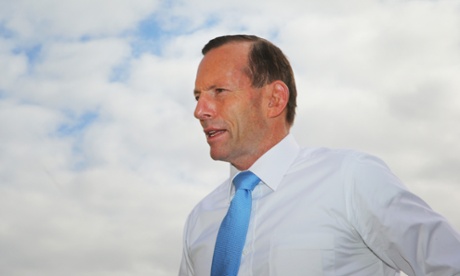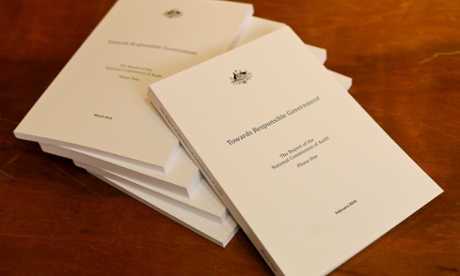Interesting column from Greg Jericho in The Guardian:
http://www.theguardian.com/business...m-tinkering-income-tax-wont-cut-it?CMP=twt_gu
.png) Australia needs revenue reform, and tinkering with income tax won’t cut it
Australia needs revenue reform, and tinkering with income tax won’t cut it
A debt levy won't solve the long-term problem of our tax system, but abolishing the tax fuel credit would be a solid start
Clouded judgment: Tony Abbott’s logic is all over the shop when it comes to the proposed tax increase.Photograph: Scott Barbour/Getty Images
The proposed “debt levy” is a good step towards improving the government’s revenue, but it is only a limited solution. While it will help increase revenue it also will increase the government’s already large reliance on income tax. Real revenue reform needs to look beyond income tax if the government wants to find permanent solutions.
There has been a lot of confusion about the debt levy. Firstly let’s cut the bull – a levy is a tax; it’s just a type of tax – usually done for a specific purpose and often (such as with the Medicare levy) charged on a person’s entire income.
Secondly it’s a stupid idea to raise a tax just to pay off a deficit so you can then give a tax break. That’s not so much robbing Peter to pay Paul, as robbing Peter to pay Peter.
Finally we need to be clear about how the levy will work.
The first reports were that it was to be a levy of 1% for those earning over $80,000, and 2% for those earning over $180,000, and that like the Medicare levy it would apply to all income. By Wednesday this had changed to the 1% and 2% merely being an increase in the tax rates, and would apply only to income earned above the respective thresholds.
This, it goes without saying, makes a big difference. For those earning over $80,000 it is an $800 difference, for those earning over $180,000 it is $3,600.
Indeed a 1% levy on all your income would mean some people would be better off not earning over $80,000. If the levy was charged on all your income, you would need to earn $81,400 before your after-tax pay would be more than had you earned just $80,000:
While 1% may not sound like much, to raise the same amount of tax by just increasing the nominal tax rate would require someone on $85,000 to pay a tax rate of 54% tax on income earned over $80,000 – that’s a fair jump from 37%.
Such a levy, while progressive, would be pretty stupid in the current economic environment. Our debt situation is not urgent, and such a tax increase would smash our already weak economic growth due to consumers cutting back spending.
As Crikey’s
Bernard Keane noted, the reduction in spending would also see goods and services tax (GST) revenue fall – making it doubly stupid.
Tony Abbott’s logic on it all was also all over the shop – arguing the increase would be temporary pain but would lead to permanent gain.
Unfortunately the problems with the revenue side of our budget are not temporary.
If we look at the past 20 years, it’s obvious there’s been a fairly dramatic change to revenue since 2007:
That was OK while the mining boom was happening and company tax was soaring. But when the global financial crisis (GFC) hit, income tax revenue fell further to 9.3% of GDP (the lowest on record).
The big income tax cuts during this time were to the top tier. The threshold for the top rate of tax went from $62,500 in 2003-04 to $180,000 by 2008-09. As I noted
two weeks ago, that saw it rise from about 1.3 times the average wage to about 2.5 now.
Crucially though, there has been little change in the ratio of the second-highest tax threshold: it has shifted between 108% to 137% of the average wage, and is currently about 110%.
But 10 years ago 15% of taxpayers were in the top tax bracket, and they raised 51% of the tax; the latest figures show only 3% pay the top tax rate and now they raise 26.2% of total tax.
So while some commentators warn of the dangers of bracket creep and
even argue the top tax threshold should have already been raised to $203,000, the reality is that fewer people in the past eight years have been paying the top tax rate than at any time in our history.
Thus increasing the top two tax rates is a sensible way to increase revenue, because it is not so large that economic growth will take much of a hit, and it certainly targets the wealthiest.
However reducing the tax, as Abbott says will happen in three years, will only see revenue fall again. Moreover the debt levy does nothing to solve the long-term problem of our tax system which, ironically, is that we rely too much on income tax:
By 2017-18 the government is expected to rely on personal income tax revenue more than it ever has since the introduction of the GST.
Direct taxes such as personal income tax and company taxes account for about 70% of government revenue. This is not an efficient way to raise tax. As we saw during the GFC, such taxes can drop pretty quickly during economic downturns. They also tax labour and capital – and thus create disincentives to work and to invest.
Most nations in the OECD have a broader tax base and direct taxes account for only about 60% of total revenue (and less if you exclude social security contributions).
The problem is exacerbated when you consider that our company tax rate needs to remain competitive with other nations because companies (unlike most workers) can leave or choose to invest elsewhere.
For now Australia remains an attractive place to invest, but in the future it is likely we will have to reduce our company tax rate to remain competitive. This was the main reason the
Henry tax reviewrecommended lowering it over time from 30% to 25%.
But doing that without changing anything else will place more burden on personal income tax.
The deficit levy will go some way to restoring the government’s revenue but ironically will exacerbate the problems with its tax base – especially because the government will also abolish the mining and carbon taxes.
For real revenue reform, tinkering with income tax won’t cut it. The issue of broadening the GST, or abolishing the fuel tax credit, ending the freeze on fuel excise indexation, remain to be tackled. Lenore Taylor
reported on Wednesday that the government was considering abolishing the tax fuel credit. Doing so would give this budget the real sniff of one that is serious about revenue reform; the debt levy does not.
.png)






